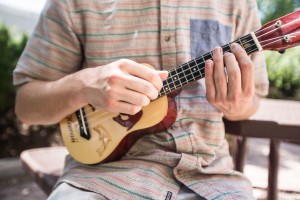
Paul Russavage brought home a ukulele from Hawaii six years ago as a souvenir and an inspiration to start a new hobby. Today he plays the the portable, trending instrument at BYU.
“During fall and winter semesters there was a group of guys that would meet up every Friday around lunch time by the library,” Russavage said. “We would just sit there and jam for a couple hours.”
Russavage is in a growing community of ukulele players throughout the state and nation, many of which will come together for the Uke Fest in American Fork, happening on July 18, 2015.
Ryan Taylor, a BYU alumnus with bachelor’s degree in music and vocal performance and a master’s degree in music composition, joined the ukulele community five years ago and founded the annual Uke Fest in American Fork in 2011.
Don’t be fooled by its small size. The ukulele has a bigger sound than assumed by most audiences and its popularity is growing as more people recognize the simplicity of it.
Ukulele heritage originates from Hawaii and the Madeira Islands and was introduced into American culture throughout the 1920s. The trend was introduced into the BYU culture five years ago.
“Making music is everyone’s heritage, and the great joy music has to offer people is in participation,” Taylor said in a press release.
Russavage supports this statement when he explained why he plays the ukulele. “I feel like the ukulele, as an instrument, is a small and portable thing, but people really enjoy seeing it, and it just makes people happy. I enjoy making people smile.”
The ukulele community “continues to grow,” Taylor said. “It’s working its way into the standard instruments.”
Russavage suggested the ukulele as a great instrument for anyone who wants to start playing music. “I feel like the ukulele is a great starting instrument, and it’s also a good transition to guitar because of similarity in music theory and chord structures.”
For more information about the Uke Fest, visit: www.utahukefest.org.




